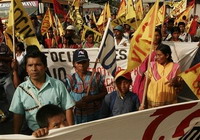America helps Costa Rica join its Central American neighbors in free trade deal
Under pressure from Washington Costa Ricans will join their Central American neighbors in a free trade deal with the U.S.

But even Sunday's referendum on the Central American Free Trade Agreement did not end a yearlong battle over the pact.
Opponents said they will wait for a mandatory recount, set to begin Tuesday, before recognizing the referendum's results. The ballot-by-ballot recount is required by Costa Rican law, and can last no longer than two weeks.
With 97 percent of precincts reporting Monday, 51.5 percent of Costa Ricans voted in favor of the trade deal, which is known as CAFTA.
Costa Rica was the lone holdout among the six Latin American nations that now comprise the trade bloc. The pact has already taken effect in the Dominican Republic, Guatemala, Honduras, Nicaragua and El Salvador.
The White House kept a close eye on Sunday's election results, having fought a bruising political battle to get the deal ratified by the U.S. Congress in 2005, when it passed the House of Representatives by just two votes.
Washington last week urged Costa Ricans to recognize the treaty's benefits and vowed not to re-negotiate the terms of the deal if voters rejected it. U.S. officials also suggested they might not renew other trade preferences now afforded Costa Rican products, set to expire next September, if the pact isn't approved.
Costa Rican President Oscar Arias called the trade deal crucial to industry in the Central American nation of 4.5 million people, where he said it will be an "important tool for generating wealth."
Opposition legislators on Monday vowed to use a pending vote on a package of 13 laws, which Costa Rica must pass by March 2008 in order to fully join CAFTA, as leverage to win increases in education outlays and farm subsidies.
Bills requiring the country to open state telecommunications and insurance monopolies to competition are among the most controversial of those 13 laws.
Critics also object to requirements that Costa Rica open its agricultural and service sectors to competitors, fearing a flood of cheap U.S. farm imports.
"For Costa Rica, CAFTA's passage is important as it will allow the continued development of technologically oriented businesses, eco-tourism, and national infrastructure by attracting more foreign direct investment," said Shannon O'Neil, a fellow in Latin America Studies at the Council on Foreign Relations, a New York-based think tank.
But "the Arias government will need to help farmers and other 'losers' from CAFTA adjust if free trade agreements are to regain their popularity," she said.
Arias, who won a Nobel Peace Prize for helping end the civil wars that ravaged Central America throughout the 1980s, said that a vote against the pact threatened trade benefits that help Costa Rica's textile and tuna industries.
But many of his countrymen are skeptical.
Costa Rica already has relatively high-paying jobs, a thriving eco-tourism industry, and is a magnet for Salvadoran and Nicaraguan migrants.
The country exported US$3.37 billion (2.38 billion EUR) in goods to the United States last year and imported products worth US$4.57 billion (3.23 billion EUR), Costa Rican trade ministry figures show.
Subscribe to Pravda.Ru Telegram channel, Facebook, RSS!


